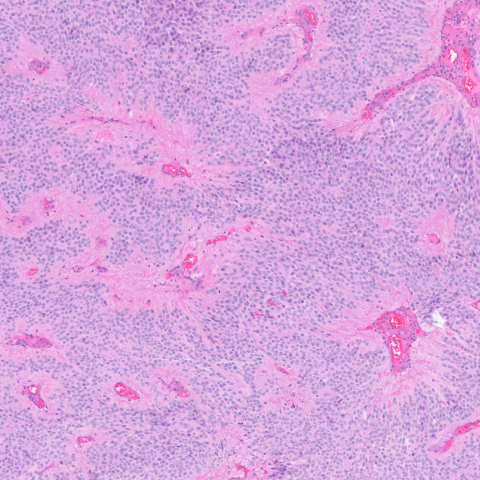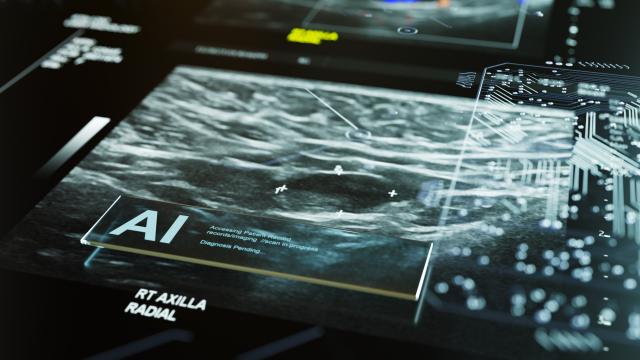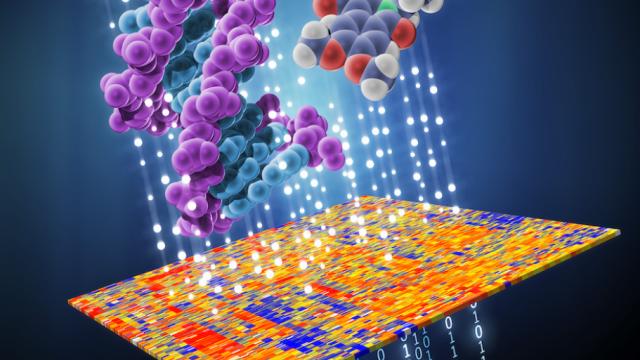
A photomicrograph of an ependymoma, a specific brain tumor type. CREDIT: Kenneth Aldape
A new artificial intelligence (AI) tool called DEPLOY can analyze images of brain tumors to predict their methylation state — essentially which genes are turned “on” or “off” — and infer the tumor subtype with 95% accuracy. The tool, which could help scientists more easily and accurately identify brain tumor subtypes, appeared May 17, 2024, in Nature Medicine.
Brain tumors can be particularly difficult to treat and understanding the molecular subtype of individual tumors could help doctors recommend more personalized and effective treatments for patients. For these reasons, Kenneth Aldape, M.D., Chief of the Laboratory of Pathology, has been working for years to collect and molecularly analyze thousands of brain tumor samples. His work has focused on using DNA methylation signatures to improve classification accuracy of the wide variety of brain tumor types.
However, such DNA methylation testing and analysis is currently only available at select laboratories. “It requires infrastructure, funds and expertise, and that's just not available in many centers, both within and outside the U.S.,” explains Aldape.
Therefore, his lab partnered with Eytan Ruppin, M.D., Ph.D., Chief of the Cancer Data Science Laboratory, who studies AI deep learning models, and his team, led by postdoc Eldad Shulman, Ph.D. Through their partnership, the researchers set out to create an AI model capable of analyzing images of tumor slides to predict the tumor subtype of brain tumors as accurately as possible.
First, they created a model that classifies brain tumor subtypes directly from slide images, followed by a second model that indirectly generates predictions for DNA methylation based on those same images. A third model classifies the tumor types based on the patient demographics, such as age and sex. Finally, the researchers combined all three of these models to create the new DEPLOY (Deep lEarning from histoPathoLOgy and methYlation) tool.
They used tumor slides collected by NCI from more than 1,700 patients to build the AI model, and then tested it in additional groups of more than 2,100 patients. The results show DEPLOY is very powerful at predicting tumor subtype, with 95% accuracy.
What’s more, the researchers then looked at a subset of 309 tumor samples that are particularly difficult to classify and demonstrated that DEPLOY could deliver more clinically relevant diagnoses than what pathologists — experts who analyze tumor samples in the lab — had initially provided.
Aldape says he sees the tool being used to support pathologists in their work. “DEPLOY could help either confirm the pathologist’s initial intuition and diagnosis, which would provide some confidence in one’s initial diagnosis, or might provide a different diagnosis that the pathologist may then test as an additional possibility,” he explains.
Ruppin points out that even large pathology labs with genetic sequencing technology can take weeks to produce results. “So there’s an urgent need to do something in the meantime, to give the oncologist some initial recommendations on what is the tumor subtype, which in turn may inform on how to tailor the treatment. That's where DEPLOY can help,” he explains, noting that the tool will be especially valuable to under-resourced communities that do not have access to any genetic sequencing technology.
Importantly, AI tumor classification models similar to DEPLOY could be created for any other type of cancer, Ruppin says, emphasizing the need for more tumor samples to expand upon existing deep-learning models and create new ones to advance cancer research and treatment.


